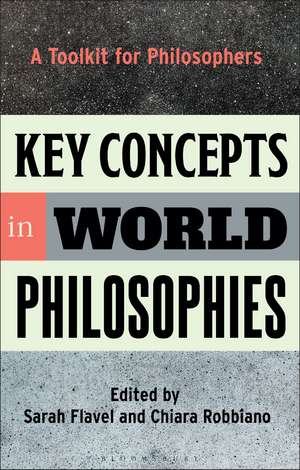Key Concepts in World Philosophies: A Toolkit for Philosophers
Editat de Dr Sarah Flavel, Chiara Robbianoen Limba Engleză Paperback – 8 feb 2023
| Toate formatele și edițiile | Preț | Express |
|---|---|---|
| Paperback (1) | 172.95 lei 3-5 săpt. | |
| Bloomsbury Publishing – 8 feb 2023 | 172.95 lei 3-5 săpt. | |
| Hardback (1) | 474.09 lei 6-8 săpt. | |
| Bloomsbury Publishing – 8 feb 2023 | 474.09 lei 6-8 săpt. |
Preț: 172.95 lei
Preț vechi: 195.73 lei
-12% Nou
Puncte Express: 259
Preț estimativ în valută:
33.10€ • 34.42$ • 27.70£
33.10€ • 34.42$ • 27.70£
Carte disponibilă
Livrare economică 21 februarie-07 martie
Preluare comenzi: 021 569.72.76
Specificații
ISBN-13: 9781350168121
ISBN-10: 1350168122
Pagini: 480
Dimensiuni: 156 x 234 x 35 mm
Greutate: 0.7 kg
Editura: Bloomsbury Publishing
Colecția Bloomsbury Academic
Locul publicării:London, United Kingdom
ISBN-10: 1350168122
Pagini: 480
Dimensiuni: 156 x 234 x 35 mm
Greutate: 0.7 kg
Editura: Bloomsbury Publishing
Colecția Bloomsbury Academic
Locul publicării:London, United Kingdom
Caracteristici
Each chapter touches on why a concept is relevant as a basis for transforming the way that we think and live, a theme designed to help students engage with new ideas and thinkers
Notă biografică
Sarah Flavel is Reader in Asian and Comparative Philosophy at Bath Spa University, UK, and President of the Society for Asian and Comparative Philosophy. Chiara Robbiano is Associate Professor of Philosophy, Honours Director and Chair of the Diversity Committee at University College Utrecht, the Netherlands. She was also a Visiting Professor in the Graduate School of Arts and Letters Tohoku University, Japan.
Cuprins
List of Contributors Preface "A Note on the "Key-Concepts" Approach and Diversification of Philosophical Curricula", Sarah Flavel Acknowledgments Introduction, "Valuing diversity", Chiara Robbiano Part I: How We Acquire Knowledge about Ourselves and Reality 1. Action and Praxis, Jin Y. Park 2. Africa, Delphine Abadie 3. Ataraxia, Frans A.J. de Haas 4. Continuous Inquiry, Chiara Robbiano 5. Emptiness, Jason M. Wirth 6. Epistemic Decolonization of Culture, Omar Rivera 7. Ezumezu, Jonathan O Chimakonam 8. Gewu (Investigation of Things), Xiao Ouyang 9. "I" as the Absolute Present, Yoko Arisaka 10. Intellectual Non-Harming and Epistemic Friction, Anand Vaidya 11. Karma, Peter D. Hershock 12. Nature, Marzenna Jakubczak 13. Perspectival Agility, Sarah Flavel and Brad Hall 14. Relational Knowing, Monika Kirloskar-Steinbach 15. Relegational Arguments, Andrew K. Whitehead 16. Science Fiction in/as Philosophy, Ethan Mills 17. Shinjin Gakudô (Studying the Way with Body and Mind), Bret W. Davis 18. Shinjin-datsuraku (dropping the bodymind), Rein Raud 19. Prasanga Method, Ethan Mills 20. Unconditioned, Russell Re Manning 21. Vital Force, Pius M. Mosima 22. Zhi (Knowing), Aaron Creller Part II: How We Cultivate Ourselves and Relate to Others 23. Double movement, Evgenia Ilieva 24. Duhkha (suffering), Stephen E. Harris 25. Equality, Hadeer Aboelnagah 26. I-Thou Relation, Michiko Yusa 27. Moral Responsiveness, Jay L. Garfield 28. Nepantla, James Maffie 29. Self-Cultivation and Political Power, Leah Kalmanson 30. The Good Life, Sebastian Purcell 31. Ubuntu/Botho, Michael Onyebuchi Eze 32. Ujamaa, Edwin Etieyibo 33. Wu wei, Yuan Zhang and Douglas L. Berger34. Xin (Heart-mind), Dascha Düring Part III: How We Express Ourselves 35. Concreteness, Paul Ziche 36. Conversationalism, Aribiah David Attoe 37. Creativity, Kiene Brillenburg Wurth 38. Diversity in Philosophy, Purushottama Bilimoria & Agnieszka Rostalska 39. Dôtoku (Expression), Gereon Kopf 40. Embodied Practice, John C. Maraldo 41. Kata, Enrico Fongaro 42. Li (Ritual), Geir Sigurðsson 43. Noh Theater Mask, Mayuko Uehara 44. Okwu, Jonathan O Chimakonam 45. Tôjisha kenkyû (participant-led research), Saku Hara Index
Recenzii
This is a brilliantly conceived volume, aimed at encouraging recognition of the diversity of philosophical ideas across the various world traditions. Dipping into just a few of the chapters should convince anyone that there are no grounds whatsoever for philosophers to ignore key ideas outside their own cultural traditions.
Can there be a better way to "take the world as the world" in philosophy than recruiting a cadre of the very best scholars across the subfields of global philosophy with each writing a substantial piece on a concept usually associated with their own careers? Sarah Flavel and Chiara Robbiano at the helm of this great ship are indeed taking world philosophy towards the boundless horizon of Nietzsche's open sea.
Contemporary Anglo-European philosophy often appears to be nothing but a temple to the achievements of dead white men. Key Concepts in World Philosophies, by Sarah Flavel and Chiara Robbiano, is a powerful antidote to philosophical ethnocentrism. This anthology is like a philosophical box of chocolates, with wide selections of delicious, "bite-sized" chapters that broaden our philosophical horizons and expand our conceptual toolkits. It is useful for both the timid beginner and the jaded cosmopolitan.
Can there be a better way to "take the world as the world" in philosophy than recruiting a cadre of the very best scholars across the subfields of global philosophy with each writing a substantial piece on a concept usually associated with their own careers? Sarah Flavel and Chiara Robbiano at the helm of this great ship are indeed taking world philosophy towards the boundless horizon of Nietzsche's open sea.
Contemporary Anglo-European philosophy often appears to be nothing but a temple to the achievements of dead white men. Key Concepts in World Philosophies, by Sarah Flavel and Chiara Robbiano, is a powerful antidote to philosophical ethnocentrism. This anthology is like a philosophical box of chocolates, with wide selections of delicious, "bite-sized" chapters that broaden our philosophical horizons and expand our conceptual toolkits. It is useful for both the timid beginner and the jaded cosmopolitan.
